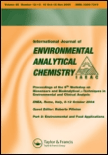
INTERNATIONAL JOURNAL OF ENVIRONMENTAL ANALYTICAL CHEMISTRY
Scope & Guideline
Driving innovation in environmental analysis.
Introduction
Aims and Scopes
- Environmental Monitoring and Analysis:
The journal aims to publish research that advances analytical methods for detecting and quantifying environmental pollutants, including heavy metals, pesticides, pharmaceuticals, and organic contaminants. - Health and Ecological Risk Assessment:
A significant focus is placed on assessing the potential health risks and ecological impacts posed by contaminants in environmental samples, emphasizing the importance of safety and sustainability. - Development of Innovative Materials and Methods:
The journal encourages studies that explore new materials, such as nanocomposites and functionalized adsorbents, for improved adsorption, degradation, and detection of pollutants. - Sustainable Practices and Green Chemistry:
Research that emphasizes environmentally friendly techniques for pollution remediation and the use of renewable resources in analytical chemistry is highlighted. - Interdisciplinary Research:
The journal promotes interdisciplinary studies that bridge environmental science, analytical chemistry, and public health, fostering collaboration across these fields.
Trending and Emerging
- Nanotechnology in Environmental Chemistry:
There is a growing emphasis on the development and application of nanomaterials for environmental remediation, detection, and analysis, highlighting their potential for enhanced performance in pollutant removal. - Integrated Approaches to Water Quality Management:
Studies focusing on integrated methodologies that combine various treatment processes for water purification are trending, reflecting an increased awareness of comprehensive water quality management. - Biosensors and Bioassays:
The use of biosensors for detecting environmental pollutants and assessing biological impacts is emerging as a significant theme, showcasing advancements in rapid and sensitive analytical techniques. - Circular Economy and Waste Utilization:
Research that explores the reuse of waste materials as adsorbents or catalysts in environmental remediation is gaining prominence, aligning with global sustainability goals. - Advanced Oxidation Processes (AOPs):
The application of AOPs for the degradation of persistent organic pollutants is increasingly featured, indicating a shift towards innovative, efficient, and environmentally friendly treatment technologies.
Declining or Waning
- Traditional Analytical Techniques:
There is a noticeable decline in the publication of studies focusing solely on traditional analytical methods, as the field moves towards more innovative and efficient techniques such as nanotechnology and advanced materials. - Limited Focus on Single Contaminants:
Research concentrating on individual contaminants without considering their interactions or the broader context of environmental health risks is becoming less prevalent. The trend is shifting towards more holistic approaches. - Static Risk Assessment Models:
Older models of risk assessment that do not incorporate dynamic environmental changes or emerging contaminants are less frequently published, as researchers seek more adaptable and comprehensive frameworks. - Environmental Impact Studies without Remediation Solutions:
Papers that only discuss the impact of pollutants without proposing remediation strategies or sustainable solutions are waning, reflecting a broader emphasis on actionable research.
Similar Journals
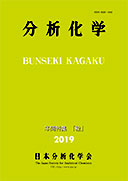
BUNSEKI KAGAKU
Empowering the Next Generation of ChemistsBUNSEKI KAGAKU, published by the Japan Society Analytical Chemistry, is a reputable journal dedicated to the field of analytical chemistry. With an ISSN of 0525-1931, this journal has been a crucial outlet for scholarly communication since its inception in 1952, converging its publication years from 1954 to 1957 and from 1959 to 2024. Although it holds a Q4 category ranking in the most recent 2023 quartiles of analytical chemistry and ranks 153/156 in Scopus, it continues to serve as a platform for quality research, fostering advancements in the field. BUNSEKI KAGAKU is based in Tokyo, Japan, and emphasizes the critical importance of analytical techniques in scientific inquiry. With a commitment to professionalism and rigor, the journal provides a vital resource for researchers, students, and professionals seeking to explore innovative methodologies and contribute to the ongoing dialogue in analytical chemistry.
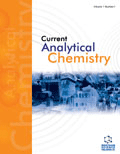
Current Analytical Chemistry
Connecting ideas for a transformative future in analysis.Current Analytical Chemistry is a pivotal journal in the field of analytical chemistry, published by Bentham Science Publishers Ltd. Established to bridge the gap between fundamental research and practical applications, this journal offers a platform for the dissemination of significant advancements and innovations from the realms of chemical analysis techniques and methodologies. With an impressive scope covering both theoretical and applied analyses, it has successfully secured a Q3 category ranking in the 2023 metrics of Analytical Chemistry, positioned at #75 out of 156 in the Scopus rankings. Researchers, professionals, and students can expect to engage with high-quality content that reflects the latest trends and issues within the discipline. Although it currently does not offer Open Access options, the journal continuously strives to maintain high editorial standards that contribute to its impactful presence in the academic community. The convergence of ideas from 2006 to 2024 promises to uphold its reputation as a reliable source for cutting-edge research in analytical chemistry.
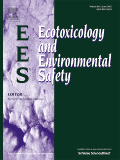
ECOTOXICOLOGY AND ENVIRONMENTAL SAFETY
Pioneering research for a safer, healthier environment.ECOTOXICOLOGY AND ENVIRONMENTAL SAFETY, published by Academic Press Inc. Elsevier Science, stands as a premier journal in the field of environmental science, specializing in the intricate relationships between toxic substances and ecological systems. With a commendable impact factor and recognized as a Q1 journal in various categories including Health, Toxicology and Mutagenesis, and Public Health, it consistently ranks among the top publications in Scopus, placing it in the 96th percentile for Medicine and Public Health. Established in 1977, this journal addresses critical issues related to environmental safety and pollution, making it an essential resource for researchers, professionals, and students alike. Although it does not offer an open access option, the journal’s commitment to publishing rigorous and impactful research makes it a vital platform for advancing the understanding of ecotoxicological risk assessments and environmental protection strategies. For those dedicated to the intersection of science and public health, ECOTOXICOLOGY AND ENVIRONMENTAL SAFETY serves as a beacon of knowledge and innovative research.
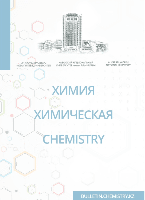
Chemical Bulletin of Kazakh National University
Advancing Chemistry through Open Access InnovationThe Chemical Bulletin of Kazakh National University is a prominent open-access journal dedicated to advancing the field of chemistry. Published by AL-FARABI KAZAKH NATIONAL UNIVERSITY, this journal serves as a vital platform for disseminating original research, reviews, and innovative findings in diverse areas of chemistry since its transition to open access in 2012. With an ISSN of 1563-0331 and an E-ISSN of 2312-7554, the journal aims to reach a global audience, fostering knowledge exchange among researchers, professionals, and students in the scientific community. The publication seeks to promote high-quality research that contributes to the understanding and application of chemical sciences, particularly in the context of Kazakhstan and the broader Central Asian region. Given the journal's commitment to making research freely accessible, it stands as an invaluable resource for anyone engaged in the study and application of chemistry.

Pakistan Journal of Analytical & Environmental Chemistry
Unveiling Insights into Analytical MethodologiesPakistan Journal of Analytical & Environmental Chemistry, published by the University of Sindh, National Centre of Excellence Analytical Chemistry, is a distinguished platform that has been committed to promoting high-quality research in the fields of analytical and environmental chemistry since its inception. With an ISSN of 1996-918X and an E-ISSN of 2221-5255, this journal has established itself as an open-access resource since 2007, facilitating the dissemination of knowledge to a global audience. Acknowledged for its contributions, the journal currently holds a Q4 category ranking in both Analytical Chemistry and Environmental Chemistry as of 2023, with Scopus rankings placing it within the challenging competitive bracket. The journal aims to publish original research, reviews, and technical notes that elucidate contemporary challenges and advancements, making it an essential read for researchers, professionals, and students who are exploring innovative methodologies and solutions in chemical analysis and environmental monitoring. By fostering a collaborative research environment and encouraging multidisciplinary approaches, the Pakistan Journal of Analytical & Environmental Chemistry plays a crucial role in advancing the field and addressing environmental concerns in Pakistan and beyond.
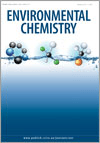
Environmental Chemistry
Exploring the Intersections of Chemistry and EnvironmentEnvironmental Chemistry, published by CSIRO PUBLISHING, is a pivotal journal in the field of environmental studies, focusing on the intricate relationships between chemical processes and environmental systems. With an ISSN of 1448-2517 and an E-ISSN of 1449-8979, this journal serves as a vital resource for researchers, professionals, and students alike, aiming to deepen their understanding of environmental chemistry. The journal, which spans the period from 2004 to 2024, boasts respectable rankings, including a Q2 categorization in both Chemistry (miscellaneous) and Geochemistry and Petrology, alongside a Q3 ranking in Environmental Chemistry for 2023. With a focus on publishing high-quality research that addresses pressing environmental challenges, Environmental Chemistry continues to make significant contributions to the field, fostering advancements in sustainable practices and innovative solutions. Researchers are encouraged to explore this journal's comprehensive archive for cutting-edge studies and discussions that are imperative for the future of environmental health and policy.

JOURNAL OF THE CHEMICAL SOCIETY OF PAKISTAN
Catalyzing Discoveries in the World of Chemistry.JOURNAL OF THE CHEMICAL SOCIETY OF PAKISTAN is a premier academic journal published by the Chemical Society of Pakistan, focusing on advancing the field of chemistry through rigorous research and scholarship. Established in 1996, this journal aims to disseminate high-quality research articles, reviews, and insights pertaining to various subfields of chemistry, making substantial contributions to both local and international scientific communities. With a current impact factor placing it in the Q4 category, the journal continues to foster discussions on emerging trends and innovations within the discipline. Additionally, it holds a Scopus rank of #305 out of 408, highlighting its growing influence despite being positioned in the 25th percentile. Although it is not an open-access journal, it provides a crucial platform for researchers and professionals in Pakistan and worldwide. The JOURNAL OF THE CHEMICAL SOCIETY OF PAKISTAN serves as a valuable resource for students, educators, and industry professionals alike, facilitating the exchange of knowledge and promoting advancements in chemical sciences.

Environmental Science-Advances
Pioneering research for sustainable solutions.Environmental Science-Advances, published by the esteemed Royal Society of Chemistry, is a pioneering open-access journal dedicated to advancing the field of environmental sciences. Having commenced publication in 2022, this journal serves as a vital platform for the rapid dissemination of high-quality research covering a broad scope, including environmental chemistry, pollution management, water science and technology, and environmental engineering. With its commitment to open access, it ensures that vital environmental research is freely available to researchers, professionals, and students worldwide, thus fostering collaboration and innovation in addressing pressing environmental challenges. Currently, the journal is ranked in the Q2 and Q3 quartiles across various categories such as Environmental Engineering and Water Science, indicating its growing influence within the academic community. With the global imperative for sustainable environmental solutions, Environmental Science-Advances is positioned to become an invaluable resource for those dedicated to the study and solution of environmental issues.

Environmental Chemistry and Ecotoxicology
Innovative solutions for ecological challenges.Environmental Chemistry and Ecotoxicology, published by KEAI PUBLISHING LTD, is a pioneering Open Access journal that has been at the forefront of research since its establishment in 2019. With an impressive trajectory that converges research excellence until 2024, the journal focuses on critical developments in the fields of environmental chemistry and ecotoxicology. It boasts a commendable market position, ranking in the top 3% among leading journals in Agricultural and Biological Sciences, Environmental Science, and related disciplines, as demonstrated by its high Scopus ranks. The journal is committed to disseminating groundbreaking research that addresses the pressing challenges of environmental sustainability and chemical safety, making it an essential resource for researchers, professionals, and students aiming to navigate the complexities of our ecological landscapes. By embracing an Open Access model, the journal ensures that valuable insights are accessible to a global audience, fostering collaboration and innovation in the field.
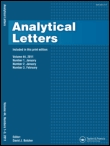
ANALYTICAL LETTERS
Transforming the Landscape of Analytical ChemistryANALYTICAL LETTERS is a reputable journal published by Taylor & Francis Inc, focusing on the dynamic fields of analytical chemistry, biochemistry, and clinical biochemistry. With an ISSN of 0003-2719 and an E-ISSN of 1532-236X, the journal has been a platform for scholarly articles since its inception in 1967, and is set to continue its contribution to the scientific community until 2024. Despite its classification in Q3 across various categories as of 2023, including analytical chemistry and spectroscopy, ANALYTICAL LETTERS maintains a significant impact within its field, evidenced by its moderate rankings within Scopus. This journal serves as a vital resource for researchers and professionals seeking to explore recent advancements in analytical methodologies, instrumentation, and applications, facilitating the dissemination of critical insights in laboratory practices. With access primarily through institutional subscriptions, it remains positioned as a crucial tool for those advancing knowledge and innovation in analytical sciences.